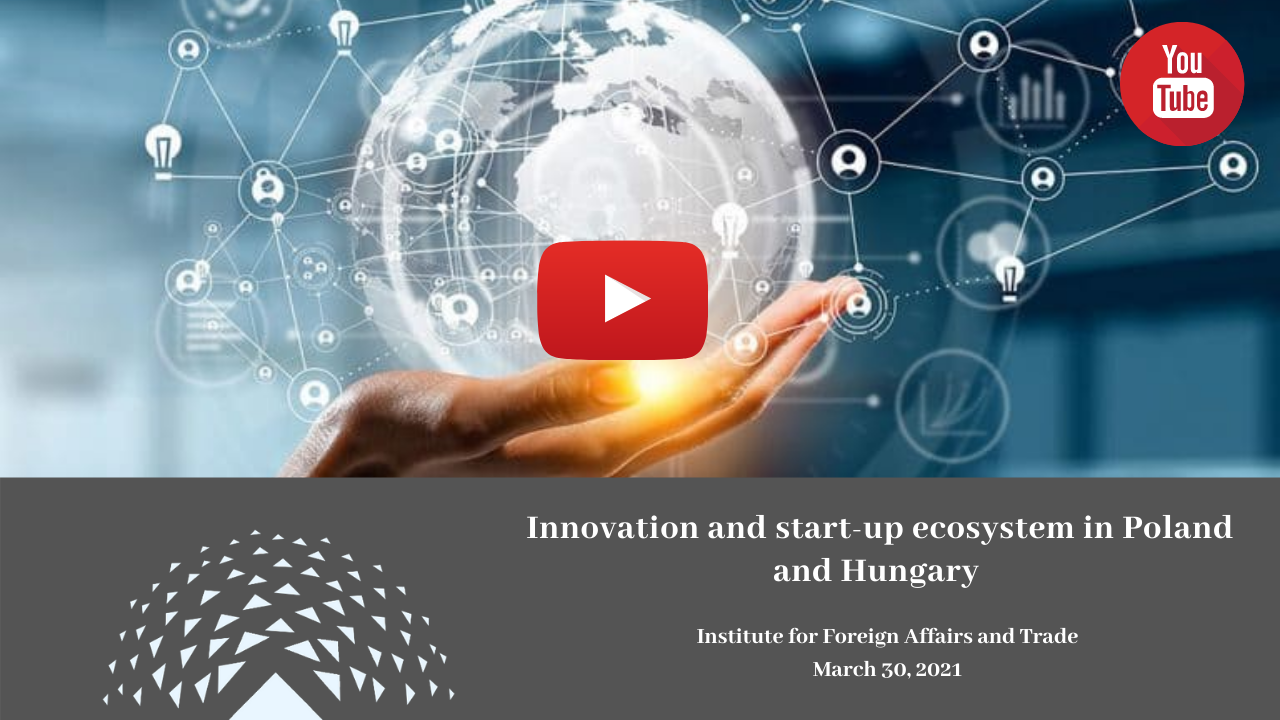On March 30, 2021, the Institute for Foreign Affairs and Trade (KKI) organized an online roundtable discussion titled „Innovation and start-up ecosystem in Poland and Hungary”. The event was the second panel discussion organized within the project supported by the Waclaw Felczak Foundation and was part of the Felczak Workshop series and the Hungarian-Polish Knowledge Base Programme. In the opening words Anna Wisniewski, project leader and associated research fellow of the Institute for Foreign Affairs and Trade emphasized that in the forthcoming months three important topics shall be discussed by the invited experts in the context of the Polish-Hungarian economic relations – green energy, innovation, and best practices in bilateral economic relations. The experts participating in the present discussion were Prof. Zoltán Cséfalvay, Head of Centre of Next Technology Futures of the Mathias Corvinus Collegium, Mr Piotr Arak, Director of the Polish Economic Institute, Ms Mária Molnár-Nagy, University Business Relations Expert at MOL Group, Mr Marcin Sowa, Head of Unit of the Department of Innovation and Industry Policy at the Ministry of Economic Development, Labour and Technology and Mr László Jónás, Head of Business Development at Design Terminál. The discussion was moderated by Dr László Vasa, Senior Researcher and Chief Advisor of the Institute for Foreign Affairs and Trade.
In his keynote presentation Zoltán Cséfalvay drew attention to the situation in the Central European region with special focus on Poland and Hungary comparing statistical data on innovation performance, talent, and financing. Upon the data, he drew attention to the fact that such regional innovation centres like Helsinki, Tallin or Prague are ahead of our major cities in this respect. In terms of funding, the situation has improved in the past years, though resources are still insufficient in our countries.
Piotr Arak emphasized that since 2015 situation in Poland especially in the field of VC (venture capital) type of financing has changed significantly. Despite pandemic, 2020 was relatively good for Polish startups. VC funds invested PLN 2.1 billion in their development and the total amount invested rose by 70% y/y. Above all, government programme supported the increase of innovation performance of companies by tax incentives, the two countries are similar in this respect.
Mária Molnár-Nagy highlighted MOL recently updated long-term strategy for innovation, where targets regarding circular economy play a key role. One of the key criteria of economic growth and modernization in our region is defining a common purpose for collaboration within the so-called ‘triple helix’, which unites the corporate sector, the state and the academic fields. Based on the concept of the Hungarian Ministry of Innovation and Technology, the hubs of innovation should be the thematic competence centers established at universities. This paradigm shift has resulted in several successful university-industry collaborations in the past 3 years, with significant benefits for corporate companies, SMEs and universities.
Marcin Sowa emphasized that the driving force of economic development should be research and development work. The “Start in Poland” focusing on the development of start-up firms, a system of tax deductions for R&D, and the Lukasiewicz network launched and being the third largest research network in Europe have all contributed to the development in innovation in Poland since 2015. The development of the start-up ecosystem forces changes in the functioning of the broadly understood institutional and financial environment, starting from shaping entrepreneurial attitudes. All activities contributing to the development of social capital in Poland supporting innovation help building start-up ecosystem reducing at the same time transaction costs.
László Jónás emphasized that continuous innovation and digitalization is not optional for market actors, it is indispensable condition for competitiveness. The Covid-19 crisis has proved to be an excellent moment to recognize the role of start-up-based innovations in the region. Start-ups need to be able to enter the markets quickly, which can be provided if accelerators that develop start-ups create active relationships with multinational corporations, SMEs, research institutions. In this process mediators play a key role to provide for this regional cooperation of the actors.
Analyzes of our researchers on the topic (in English):
- KKI 4:1 – The innovation and start-up ecosystem in Poland and Hungary
- KKI 4:1 – Green Energy in Focus – Investment Incentives in Poland and Hungary
The full recording can be accessed at the following link or on our YouTube-channel!
JTNDaWZyYW1lJTIwd2lkdGglM0QlMjIxMDAlMjUlMjIlMjBoZWlnaHQlM0QlMjI0NTAlMjIlMjBzcmMlM0QlMjJodHRwcyUzQSUyRiUyRnd3dy55b3V0dWJlLmNvbSUyRmVtYmVkJTJGOEZBd1pjMmJjaEElMjIlMjB0aXRsZSUzRCUyMllvdVR1YmUlMjB2aWRlbyUyMHBsYXllciUyMiUyMGZyYW1lYm9yZGVyJTNEJTIyMCUyMiUyMGFsbG93JTNEJTIyYWNjZWxlcm9tZXRlciUzQiUyMGF1dG9wbGF5JTNCJTIwY2xpcGJvYXJkLXdyaXRlJTNCJTIwZW5jcnlwdGVkLW1lZGlhJTNCJTIwZ3lyb3Njb3BlJTNCJTIwcGljdHVyZS1pbi1waWN0dXJlJTIyJTIwYWxsb3dmdWxsc2NyZWVuJTNFJTNDJTJGaWZyYW1lJTNF

